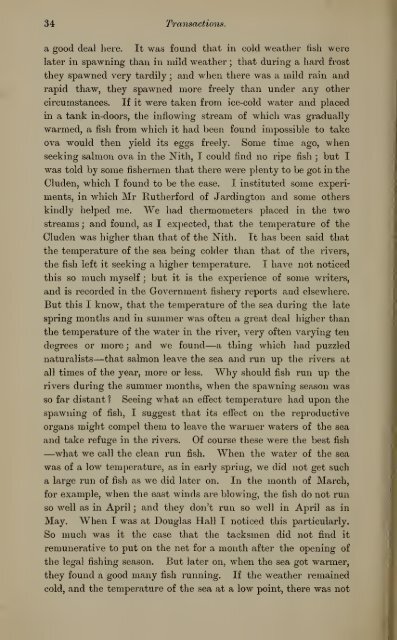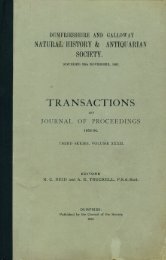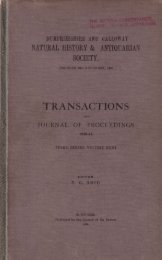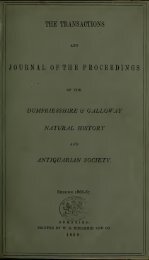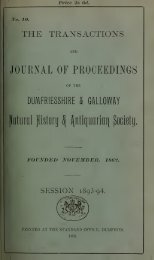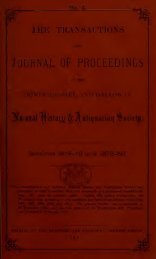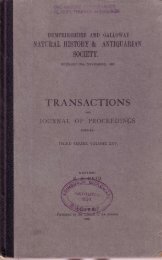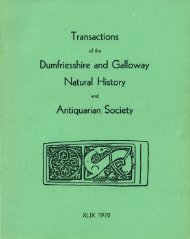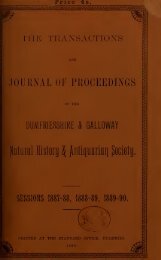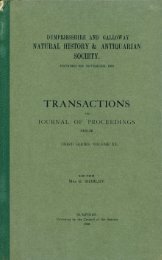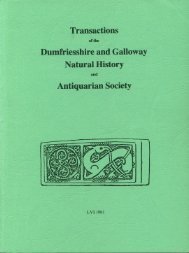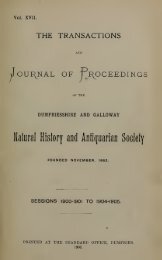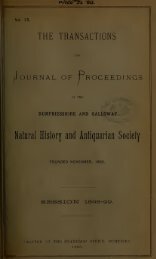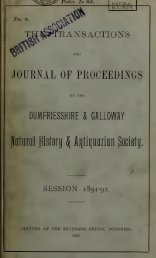Vol 5 - Dumfriesshire & Galloway Natural History and Antiquarian ...
Vol 5 - Dumfriesshire & Galloway Natural History and Antiquarian ...
Vol 5 - Dumfriesshire & Galloway Natural History and Antiquarian ...
Create successful ePaper yourself
Turn your PDF publications into a flip-book with our unique Google optimized e-Paper software.
34 Transactions.a good deal here. It was found that in cold weather fish werelater in spawning than in mild weather ;that during a hard frostthey spawned very tardily ; <strong>and</strong> when there was a mild rain <strong>and</strong>rapid thaw, they spawned more freely than under any othercircumstances. If it were taken from ice-cold water <strong>and</strong> placedin a tank in-doors, the inflowing stream of which was graduallywarmed, a fish from which it had been found impossible to takeova would then yield its eggs freely. Some time ago, whenseeking salmon ova in the Nith, I could find no ripe fish ; but Iwas told by some fishermen that there were plenty to be got in theCluden, which I found to be the case. I instituted some experiments,in which Mr Rutherford of Jardington <strong>and</strong> some otherskindly helped me. "We had thermometers placed in the twostreams ; <strong>and</strong> found, as I expected, that the temperature of theCluden was higher than that of the Nith. It has been said thatthe temperature of the sea being colder than that of the rivers,the fish left it seeking a higher temperature.I have not noticedthis so much myself ; but it is the experience of some writers,<strong>and</strong> is recorded in the Government fishery reports <strong>and</strong> elsewhere.But this I know, that the temperature of the sea during the latespring months <strong>and</strong> in summer was often a great dealhigher thanthe temperature of the water in the river, very often varying tendegrees or more ; <strong>and</strong> we found—a thing which had puzzlednaturalists—that salmon leave the sea <strong>and</strong> run up the rivers atall times of the year, more or less. Why should fish run up therivers during the summer months, when the spawning season wasso far distant ? Seeing what an effect tempei'ature had upon thespawning of fish, I suggest that its eSect on the reproductiveorgans might compel them to leave the warmer waters ofthe sea<strong>and</strong> take refuge in the rivers.Of course these were the best fish—what we call the clean run fish. When the water of the seawas of a low temperature, as in early spring, we did not get sucha large run of fish as we did later on. In the month of March,for example, when the east winds are blowing, the fish do not runso well as in April ; <strong>and</strong> they don't run so well in April as inMay. When I was at Douglas Hall I noticed this particularly.So much was it the case that the tacksmen did not find itremunerative to put on the net for a month after the opening ofthe legal fishing season. But later on, when the sea got warmer,they found a good many fish running. If the weather remainedcold, <strong>and</strong> the temperature of the sea at a low point, there was not


